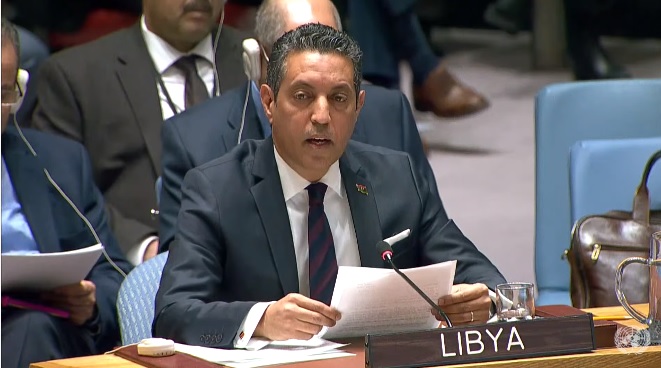Libya's Permanent Representative to the United Nations: Libya's cooperation with the International Criminal Court must be based on integration and support for the national judiciary.
Pulbished on:
New York, November 25, 2025 (LANA) – Libya’s Permanent Representative to the United Nations, Taher El-Sunni, affirmed the continued cooperation between the Presidential Council, the government, and the Libyan Attorney General with the International Criminal Court (ICC), despite current challenges. He commended the Court’s role in holding perpetrators of international crimes in Libya accountable.
In his address to the Security Council regarding the ICC Prosecutor’s report on Libya, El-Sunni emphasized that the government considers the rights of Libyan victims a top priority. He stressed that the Court’s jurisdiction should be based on the principle of complementarity, not substitution, and that national courts are the primary and rightful authorities.
He explained that this principle was discussed with the Deputy Prosecutor to strengthen it through cooperation and the exchange of investigations, evidence, and clues, particularly when arresting or investigating suspects under national legislation is not possible. He emphasized that any arrest warrants issued by the Court concerning Libyan citizens are to be executed by the Libyan Public Prosecutor’s Office, unless this proves impossible, in which case the Court’s complementary role is activated.
The delegate reviewed the Public Prosecutor's efforts in the Tarhuna mass graves case, explaining that "614 cases were investigated, 255 judicial decisions were issued, and 220 cases were referred to the International Criminal Court. Fifty-two individuals were detained pending investigation, and investigators issued 111 arrest warrants for individuals accused of committing murder, kidnapping, enforced disappearance, and torture."
He noted that five wanted perpetrators of these crimes, which amount to war crimes, are fugitives abroad, and he urged the court to intensify efforts and coordinate with the Public Prosecutor's Office to ensure their arrest.
The delegate also highlighted efforts to combat terrorism and organized crime, indicating that the Deterrence Apparatus submitted 1,231 cases to the Public Prosecutor's Office, most notably 38 cases of membership in a banned organization. These cases led to the arrest of Hashim Abu Sidra (the ISIS governor), which contributed to weakening the organization both domestically and internationally.
Regarding human trafficking and migrant smuggling, Al-Sunni revealed that 26 cases have been filed against defendants and dozens of suspects of foreign nationalities have been arrested. He stressed the necessity of trying the accused according to national legal procedures and emphasized that any individual transgressions do not represent the state or its institutions.
The delegate added that crimes do not have a statute of limitations under Libyan law, and that supporting the national judicial system, including the Public Prosecutor's Office, investigation teams, and judicial and law enforcement agencies, is essential for the continued administration of justice, despite the existing divisions.
He called on the court to uphold the principle of complementarity and improve communication channels, warning against succumbing to pressure or politicizing its work.
The Permanent Representative of Libya to the United Nations asserted that the crimes and atrocities in Libya are a consequence of the absence of a comprehensive political solution and negative interventions over the past 15 years. He affirmed that Libya does not wish to remain on the agenda of the International Criminal Court or under Chapter VII of the UN Charter indefinitely.
In closing, the delegate called on the international community to focus its efforts on supporting national reconciliation through transitional justice and truth-seeking, based on the fundamental principle: "There can be no peace without justice."
...(LANA)...




